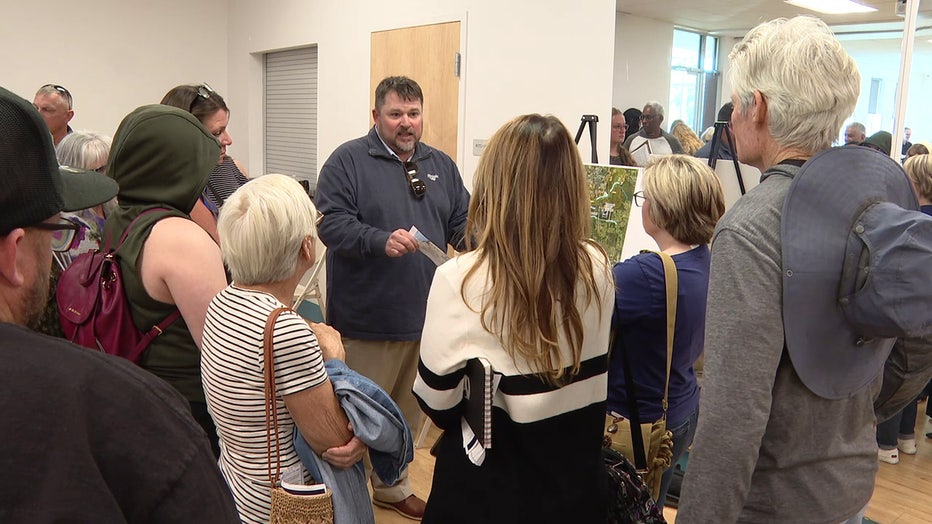Mosaic holds public information session over plans for underground wastewater well

Public meeting for wastewater test well
FOX 13's Jordan Bowen reports that dozens of Plant City residents filled a meeting hall Tuesday night to learn more about Mosaic's plans to build an underground test well that could be injected with treated wastewater.
PLANT CITY, Fla. - Dozens of Plant City residents filled a meeting hall Tuesday night to learn more about Mosaic's plans to build an underground test well, which could be injected with treated wastewater. Mosaic owns many of the state's current phosphate stacks.
Dig deeper:
"If you have water in any kind of industrial facility, and you need to treat it and dispose of it, it's good to have multiple options, and so they have the option to treat and surface water discharge, but you also have the option to use UIC," RESPEC's National Hydrogeology Practice Lead David Brown said.
RELATED: Mosaic, Inc. exploring underground wastewater well, raising concerns amongst environmental group
UIC stands for Underground Injection Control. Mosaic is currently in the process of applying for a permit from the state to build an exploratory well at their Plant City facility near the Hillsborough-Pasco County line, which could eventually be injected with wastewater. It's something environmental groups like ManaSota-88 are strongly pushing back on.
What they're saying:
"The problem with that is that all wells will leak over time, and that if there is a problem, by the time you discover that there is, there is something that needs to be done. It'll be too late to do anything about it. So once groundwater is contaminated, it's contaminated forever," ManaSota-88 Director Glenn Compton said.

The other side:
The well would be constructed 8,000 feet below the surface. As part of the permit application process, they must hold public information sessions, much like Tuesdays, then the state will take the feedback received and either approve or deny the permit.
"Very, very sophisticated testing has to go on. It also has dedicated well monitors and the well itself is perpetually monitored, so there's safeguards built upon safeguards on top of that to prevent what people are concerned about," Brown said.
Why you should care:
Once approved, Mosaic would test the well to see if it is suitable for injecting treated phosphate gypsum wastewater. If it is, they would then have to apply for another permit to actually inject it which would again require public input.
"Unfortunately, the water that is part of the waste disposal is something that the residents in the state of Florida are going to have to deal with for generations to come," Compton said.
What's next:
It could be a few months until the Florida Department of Environmental Protection decides whether to approve or deny Mosaic's permit. Once that happens, we'll know more about if or when wastewater could be injected into the well.
The Source: The information in this story was gathered during an information meeting on Mosaic's plan to build an underground test well.
WATCH FOX 13 NEWS:
STAY CONNECTED WITH FOX 13 TAMPA:
- Download the FOX Local app for your smart TV
- Download FOX Local mobile app: Apple | Android
- Download the FOX 13 News app for breaking news alerts, latest headlines
- Download the SkyTower Radar app
- Sign up for FOX 13’s daily newsletter

